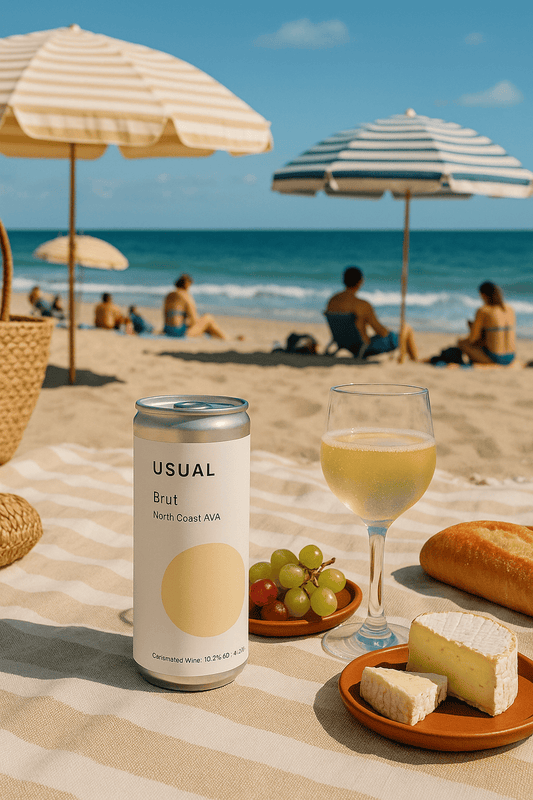
Why You Should Be Skeptical of Sulfite-Free Wine
McKenzie HaganWith the rising popularity of sulfite-free wine, many wine lovers are left wondering if they should cool it on their favorite Chardonnay and reach for an organic bottle of wine instead.
But are sulfites really hurting us? Could our beloved red blends and refreshing rosés be giving us headaches?
Luckily, the harmful effects of sulfites in wine have been greatly exaggerated. In fact, in this article, we’ll break down exactly why you shouldn’t be worried about sulfites in sulfite free wine brands.
Understanding Sulfites: The Preservers in Your Wine
You may have only noticed them sneaking about in the fine print on your wine label, but sulfites are common additives.
Scientifically speaking, sulfites (or sulfur dioxide, as they are also known) are chemical compounds that contain the sulfite ion.
While sulfites occur naturally in some foods (and are even found in the human body), they are also commonly added to food and drinks, due to their preservative, antioxidant nature.
The Tale of Two Sulfites in Your Wine
There are two types of sulfites you should be familiar with: natural sulfites and added sulfites. Both of which are commonly found in wine and both of which are nothing to worry about.
When it comes to wine, naturally occurring sulfites cannot be avoided — they are naturally occurring compounds that are produced during the fermentation process. This is why you should be skeptical of any wine bottles that claim to contain sulfite-free wine, as it’s pretty much impossible to produce wine without any sulfites at all.
As for added sulfites, it’s not just the wine industry taking advantage of the impressive antibacterial properties of sulfites. These compounds are added to many perishable foods, including:
- Dried fruits
- Condiments
- Canned fruits and vegetables
- Jams and other preserves
- Potato chips
- Baked goods
The role of sulfites in wine is to preserve the color, flavor, and aroma that the winemaker intended, as well as lengthening its shelf life.
Without these protective preservatives, wine is vulnerable to oxidation (which causes the wine to go bad, taking on a putrid, vinegar flavor), as well as yeast and bacteria. It’s difficult to keep wine and other perishables in perfect condition for transport and storage. Taking advantage of the preservative power of sulfites stops your favorite bottle of Syrah from becoming a very expensive vinegar.
Are Sulfites in Wine Harmful?

The FDA (Food and Drug Administration) demands that producers adding sulfites to their foods say so on the packaging. Adding sulfites to certain meats is also forbidden, as sulfites can disrupt the nutritional value of the product.
To get away with a warning-free label, the product must contain less than 10 ppm (parts per million) of sulfites. This is why some organic wine brands can legally state they are sulfite-free, even though they contain natural sulfites.
To put that in perspective, while the average bottle of white wine contains 80 ppm, a bag of dried fruit (you know, the ones that you would routinely give to a child as a lunchtime snack) contains 3500 ppm.
Seeing how prevalent sulfites are in our foods (you probably consume more sulfites from your daily oatmeal toppings than your nightly glass of red wine), it’s safe to say that for the majority of the population, sulfites are not harmful.
However, there are always exceptions to the rule, and you could be one of the unlucky ones.
The Unusual Case of Sulfite Allergy
Unfortunately, 1% of the U.S. population suffers from a sulfite allergy (otherwise known as sulfite sensitivity). This allergy is no laughing matter and can be life-threatening.
This very unlucky minority will have an allergic reaction almost immediately after consuming sulfites. Common side effects include:
- Hives
- Diarrhea
- Stomach pain
- Swelling of the face and throat
- In rare cases, death
Those most likely to suffer from sulfite sensitivity also suffer from asthma, especially those who use steroids to treat it.
If you recognize any of these side effects and fear you may have the dreaded allergy, get in touch with your doctor, as there are many foods and drinks you will need to be wary of — not just wine — and you may need to be armed with an inhaler from now on.
If however, you’ve heard sulfites could be the cause of your wine headaches and are looking for answers, we’re happy to tell you it’s very unlikely that you have sulfite sensitivity. Wine headaches are typically a result of overindulging in alcohol, one of the pitfalls of having a really good time and not drinking enough water.
Still don’t believe us? Think about the last time you ate a handful of dried apricots, did you wake up the next day with a pounding head and a feeling of regret? No? Then, it’s probably not sulfites causing you grief.
Should We Opt for Wines Without Sulfites?
As we’ve mentioned, it’s impossible for wine to be completely sulfite-free. So, how can there be so many sulfite-free wines on the market?
Well, in the eyes of the FDA, some organic wines (or natural wines) can make the “sulfite-free” claim if the amount of sulfites is lower than 10 ppm in a bottle.
These certified organic wines will have very low intervention during the winemaking process. This means preservatives, like sulfites, will not be added to the wine, and instead organic winemakers will depend on the naturally occurring preservatives in the grapes.
It's important to note that just like conventional wines, organic wines or wines without sulfites can come in a variety of styles, tastes, and aromas. Many wine lovers have reported that they can't tell the difference between a sulfite-free wine and one with sulfites. So, if you're inclined to try sulfite-free wines, don't let the fear of a taste difference hold you back. These wines can still offer an enjoyable drinking experience.
If you are curious about organic wine, we say go for it! However, there are some downsides you should be aware of. Because these bottles have lower levels of sulfites they will not keep, so they’re best drunk straight away. This means some of these wines lack the complexity that aging can give a wine. Organic wine can also have a mind of its own when it comes to appearance — often these wines can become cloudy or take on an unappetising brown color.
If you are considering throwing in the towel on sulfites due to an allergy, wine is the least of your problems. To relieve yourself of these life-threatening symptoms, you will have to eat a diet with no sulfites — this means removing a lot of preserved foods from your kitchen. Check out this list to know what to look out for.
For everyone else, we don’t advise going to the sulfite-free side, mainly because we don’t see a reason to. Aside from sulfites, wine often contains sugar (natural and added) and plenty of alcohol, so if it's making you feel bad, it may be a case of cutting back, rather than cutting it out altogether.
Our single-serving bottles are perfect for anyone looking to reduce their alcohol intake, without giving up the wine they love. Rather than committing to an entire 750 ml bottle, try one of our mini bottles today.
Don’t Abandon What You Love for Sulfate

While completely sulfite-free wines don’t technically exist, there are plenty of organic low-sulfite wines on the market. These wines will have less winemaker intervention but have a much shorter shelf life and may not always taste or look like the Pinot Noir you’ve become accustomed to.
If you’re worried about sulfites in wines, but have no reason to suspect you have a sulfite allergy, don’t be — they won’t hurt you. Sulfites are safe and are found all over the food industry. After all, you’re far more likely to have a reaction to a handful of raisins than a hearty glass of Tempranillo.








